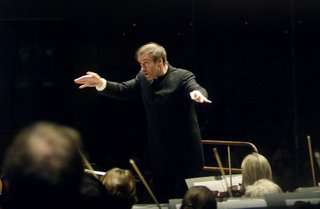|
Back
The Magnificent Four New York
Avery Fisher Hall, Lincoln Centre
03/30/2009 -
Sergei Prokofiev: Symphony No. 4 in C Minor, Opus 47 (Original version) – Violin Concerto No. 2 in G minor, Opus 63 – Symphony No. 5 in B-flat major, Opus 100
Vadim Repin (Violin)
London Symphony Orchestra, Valery Gregiev (Conductor)

Valery Gergiev (© Anna Eriksson/SR)
When Valery Gergiev lay down his baton on the final stinging chords of Prokofiev’s Fifth Symphony, he concluded, for this writer, a triumvirate of great composer “weeks” in my life. The first was when Seiji Ozawa brought the Boston Symphony and Harvard-Radcliffe Choir to Hong Kong for five straight nights of Berlioz The second was an unlikely one. The Helsinki Orchestra presented all the symphonies of Sibelius in four nights. Hearing them by a provincial orchestra instead of the usual gloomy elephantiasis of mainstream orchestras was a revelation.
With Gergiev, we had not only the world’s finest conductor of Russian music, but his own London Symphony Orchestra, an ensemble which is of course technically perfect, but which also, like litmus paper, immediately takes up the aura, the atmosphere, and above all, the tension which Gergiev conveys to the group.
It was a mammoth amount of Prokofiev to take in at four sittings. But every work, if sharing those clear, dynamic trademarks of the Russian composer, showed how every work was totally different, in form, meaning (whatever that means) and goal
A case study was the Fourth Symphony, given two performances. Last night was the original score, published in 1929, taken from the ballet The Prodigal Son. Sunday afternoon was the “revised” version, published 18 years later. The differences were astonishing.
The first version was not light, but in less than 25 minutes, little was developed. We had the genius in the first movement of an almost austere, almost modal work which gave its lovely themes, developed them with a few puffs of magical smoke, and then were gone. The second movement had its moments, but lyrically they were again gone quickly. The final movement was, as ever, exciting, but it seemed an excitement where the fervor was extinguished before it could flame.
Yes, last night’s work was compact in time—but Prokofiev rarely ever puts in “filling”. His orchestras dart from key to key, rhythm to rhythm, orchestral effects which never fail to amaze. Which is why relative brevity means nothing. Not when we had in the “revised” first movement, incredibly big brass choruses (with wood-blocks and piano!!) that were not injected, but were developed. Where the brass medieval sounds could be varied (with a gorgeous tuba solo), which had (oh, I dislike this word) gravitas. The rest of the symphony was just as expansive. In the second movement, the addition of the piano gives the mesmerizing effect of the theme repeated with keyboard and divided strings.
I may be wrong, having heard the original version for the first time, but I don’t believe it had the stunning trio of the third movement oboe and plucked strings. The finale last night was short, clever, dynamic, but the revised version let out all the stops, repeated and came back again with one of the most exciting codas of any of the symphonies.
As for Gergiev, he held both symphonies together through that singular knife-edge tension. Inevitably when speaking of Prokofiev, one has to use the word “irony” or “tongue-in-cheek”. That, though, was missing with Gergiev. Each piece is so dramatically overwhelming that acerbity is relegated to a far-off corner. I don’t think the Fourth can hold its own with the very best symphonies, but to hear the two was simply another experience of the mini-festival.
Vadim Repin appeared for the second time, here playing the Second Violin Concerto. Where the first was ethereal, distant, almost transcendent, this is a virtuosic masterpiece. And unlike the middle symphonies, nothing is complicated. Simply beautiful themes (from which Repin achieved maximum digital mileage) and a second movement of the most admirable lyricism.
Each of the soloists has presented an encore. But last night’s was special, as Mr. Repin included the LSO’s “guest leader”, Andrew Haveron, in a movement from the composer’s Sonata for Two Violins. It was a wild five minutes of “dueling fiddles”, with technicians of the highest order.
Most of the symphonies, while fascinating, are often very attractive flash and filigree. The Fifth, even with its Soviet-style simplicity, is epic, cohesive, the effects are neither to shock or to stun. One could speak of Gergiev’s bold opening, his rip-roaring second movement or the too rapid ending crescendo of the Adagio or the extraordinary ending. But, to paraphrase Mr. Armstrong, “If you didn’t hear it, you don’t get it.”
We fortunate few got four nights of Gergiev, the LSO and concerts which were both significantly eclectic and singularly electrifying.
Harry Rolnick
|